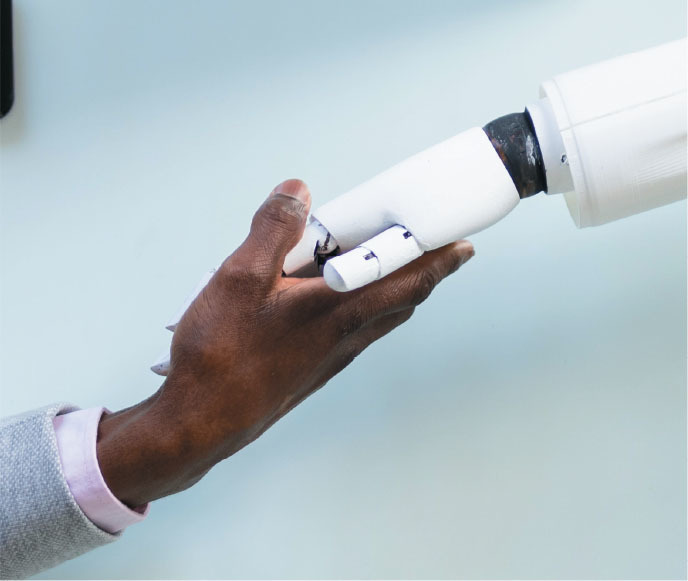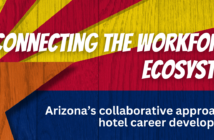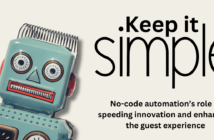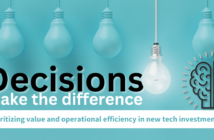Staffing, labor shortages, retaining quality team members, and technology’s part in the hiring process
With workforce shortages continuing to be a problem in the industry, we’re devoting considerable time and energy in this issue to discussing multiple facets of hospitality employment. In this three-part article, we’re exploring best practices for hiring, training, and keeping qualified team members, while also covering AI’s role in recruiting top talent.

Part I: Leveraging AI in recruitment and training for inclusivity and efficiency in the hospitality industry
In today’s rapidly evolving hospitality industry, the effective recruitment and training of employees are essential for delivering excellent guest experiences. With the advent of artificial intelligence, hotels have the opportunity to streamline their processes, enhance inclusivity, and provide a seamless candidate experience.
INCLUSIVITY IN RECRUITMENT
One of the challenges faced by hotels in regards to recruitment technology is ensuring the recruitment process is inclusive for all candidates. Not all potential employees have access to computers to create polished resumes or fully understand complex questionnaires. AI can be a valuable ally in overcoming these hurdles.
AI-enhanced résumé creation: For candidates who lack computer access or are unfamiliar with résumé formatting, AI-powered tools can help simplify the process. These tools can guide candidates in creating résumés, suggesting improvements and tailoring the content to suit the specific position based upon the job description. This feature ensures applicants from various backgrounds can present their skills and experiences effectively.
Accessible questionnaires: When using AI in questionnaires and assessments, hotels should focus on making them userfriendly. These tools can be designed to provide simplified, jargon-free instructions and support to applicants who may struggle with complex language or technical terminology. Additionally, voice-recognition software can enable applicants to complete questionnaires verbally, catering to diverse abilities and backgrounds.
Hotels can make these tools available on their websites to assist potential employees.
OPTIMIZING RÉSUMÉS WITH AI KEYWORDS
In a highly competitive job market, having a resume that stands out is crucial. AI can assist hotels in identifying the most relevant keywords to include on applicants’ resumes, ensuring their qualifications align with the job requirements. This not only simplifies the screening process but also increases the chances of matching the right candidate with the right position.
AI-driven keyword analysis: AI can analyze job descriptions and identify keywords commonly associated with specific roles. This analysis assists applicants in tailoring their résumés to include these keywords, increasing the likelihood of their résumés being shortlisted for consideration.
TRANSPARENT COMMUNICATION
One of the most common complaints from job applicants is the lack of communication during the recruitment process. Hotels can use AI to address this issue by automating communication at different stages of the hiring process, ensuring applicants always are in the loop.
Automated acknowledgments: AI can be employed to send immediate acknowledgments to applicants once they’ve submitted their applications. These automated responses reassure candidates their application has been received and is under review. This step alone can significantly improve the candidate’s experience.
Status updates: As the recruitment process progresses, AI can provide regular status updates to candidates. Whether it’s notifying them they’ve moved to the next round of the selection process or informing them the position has been filled, this level of transparency reduces uncertainty and anxiety for applicants.
Feedback mechanisms: AI-driven feedback tools can provide constructive feedback to candidates who didn’t make it to the next round. Constructive criticism can help applicants improve and potentially be successful in future job applications. This step is a valuable part of nurturing a positive employer brand.

NICOELNINO/SHUTTERSTOCK.COM
PERSONALIZED LEARNING
By embracing AI in training, hotels can provide more efficient, consistent, and personalized learning experiences for their employees, ultimately resulting in enhanced service quality and guest satisfaction.
Tailor learning: AI can tailor training modules to individual employees’ strengths and weaknesses. By analyzing their performance and preferences, AI can provide personalized learning paths, ensuring each employee receives the training they need to excel in their specific roles.
Cost savings: Automating training processes with AI can lead to significant cost savings. Hotels can reduce the need for physical training materials and manual trainers, while also minimizing the time spent off the job for employees.
SEARCHING AI TOOLS
Hotels can discover AI tools through a systematic approach. Many AI tools are available on online marketplaces or directories. You can search for AI solutions on platforms like Capterra, G2 Crowd, or Hotel Tech Report. Visit the websites of AI vendors that specialize in hospitality solutions. They often provide detailed information about their products, case studies, and customer reviews.
Once you identify potential AI tools, reach out to the vendors and request demos or trials. This allows you to see how the tools work and evaluate their suitability for your hotel. Ask the vendors for references or case studies from other hotels that have used their AI tools. Talking to existing customers can provide valuable insights into the effectiveness and reliability of the tool. Be sure to check with your IT Department if the AI tool can integrate with your existing hotel management systems and technology stack. Seamless integration is crucial for maximizing the tool’s effectiveness. Ensure the AI tool complies with data privacy and security regulations, especially if it involves handling guest data.
In a sector as dynamic and people-centric as hospitality, ensuring the right people are in the right roles is essential. AI can help hotels achieve this goal efficiently and effectively while also addressing common pain points for both recruiters and applicants. Embracing AI isn’t just a step toward the future; it’s a commitment to providing an exceptional candidate experience and ensuring the continued success of the hospitality industry.
Part II: The importance of real-life experience in a hotel when recruiting and training.
Hospitality is a complex, dynamic field that relies on the talent and expertise of its employees to deliver exceptional guest experiences. Inside the hotel, understanding job roles is paramount when recruiting and training employees. Whether you’re hiring new talent or promoting existing employees, deep knowledge of the positions within your hotel is essential. Recruiters and trainers should be intimately familiar with the responsibilities, challenges, and expectations of each job role.

NOIN90650/SHUTTERSTOCK.COM
A recruiter or trainer who comprehends the intricacies of these roles in a hotel can make more informed decisions, select the right candidates, and design effective training programs. Real-life experience in these roles provides valuable insights into the specific skills and competencies required to excel, making the hiring and training process more efficient.
OPEN COMMUNICATION WITH DEPARTMENT LEADERS
Effective communication between recruiters, trainers, and department leaders is crucial for ensuring candidates and employees are well-prepared for their roles. Department leaders play a pivotal role in setting expectations for the ideal candidates, helping recruiters identify the qualities and skills necessary for success.
Additionally, department leaders can provide valuable input on training topics. They can pinpoint the technical and emotional aspects that are most relevant to their department’s daily operations. Open dialogue and collaboration between HR, training, and department heads create a cohesive approach to recruitment and training that aligns with the hotel’s overall goals.
UNDERSTANDING INTERDEPARTMENTAL DYNAMICS
In a hotel, various departments must work seamlessly together to provide guests with an exceptional experience. For example, the front desk and housekeeping departments collaborate closely to ensure rooms are ready for new arrivals and guest check-ins are smooth. Understanding these interdepartmental dynamics is critical for recruiters and trainers.
Recruiters should seek candidates who not only excel in their specific roles but also can work well in a team. Likewise, trainers must educate employees on the importance of cross-departmental cooperation, highlighting how each department’s contributions impact the overall guest experience. Real-life experience in multiple departments provides a holistic view of how the hotel functions as a whole.
REDUCED TURNOVER RATES
Many establishments often fall into the trap of hastily filling positions with warm bodies, only to later realize the individuals aren’t the right fit. This can lead to high turnover rates, which are both costly and disruptive to hotel operations. One of the root causes of this issue is a lack of emphasis on providing a strong foundation during the onboarding and interview process. When recruiters and trainers prioritize real-life experience, they’re better equipped to set the stage for long-term employee retention.
Candidates who receive detailed information during the interview process are better positioned to make informed decisions about the role and the hotel’s expectations. Recruiters who can provide a comprehensive understanding of the daily expectations, the work environment, and the hotel’s culture during interviews are more likely to attract candidates who align with these expectations. This alignment reduces the likelihood of mismatched expectations, which can lead to dissatisfaction and, ultimately, employee turnover.
THE VALUE OF IMMERSION
To truly understand the complexities and nuances of the hotel industry, recruiters and trainers should immerse themselves in the environment. This means spending time in different departments, attending department meetings, and actively engaging with employees.
Walking the floors instead of conducting recruitment and training from behind a desk offers invaluable insights. It allows recruiters and trainers to experience firsthand the daily challenges and triumphs of employees. This immersive approach builds trust and credibility, as employees appreciate leaders who invest time and effort to understand their roles.
Recruiters and trainers who embrace immersion often discover new opportunities for improvement and innovation. They can identify areas where training is most needed and where potential candidates may lack necessary skills. This firsthand experience also can lead to the development of more effective and relevant training programs.
PRIORITIZING REAL-LIFE EXPERIENCE
In the hotel industry, the importance of real-life experience when recruiting and training employees cannot be overstated. Recruiters and trainers who fully understand job roles, maintain open communication with department leaders, and immerse themselves in the operational aspects of the hotel are better equipped to build a skilled and cohesive workforce.
Hotels can hire and train employees who are not only competent in their specific roles but also adept at working together to deliver exceptional guest experiences. This approach leads to increased guest satisfaction, employee engagement, and ultimately, the success of the hotel. In an industry where the quality of service is paramount, recruiting and training from a place of firsthand experience is the key to excellence.
Part III: Boost your hotel employee engagement this year. 20 unique ways to move past pizza parties.
Employee engagement is crucial for the success of any business, especially in the hospitality industry. Happy and engaged employees provide better service, increase guest satisfaction, and ultimately improve a hotel’s bottom line. While pizza parties and other traditional methods have their place, it’s time to think outside the box and explore new ways to boost employee engagement in your hotel. Here are 20 unique ideas to revitalize your workforce:
- Peer recognition programs: Encourage employees to recognize and celebrate each other’s accomplishments. Implement a system where team members can nominate their peers for a job well done. Recognized employees could receive special perks or rewards.
- Mentorship and buddy systems: Pair experienced employees with new hires. This not only helps new employees integrate quickly but also fosters a sense of belonging and support within the team.
- Wellness challenges: Promote physical and mental well-being through friendly competitions. Consider step-count challenges, meditation sessions, or healthy eating contests. Offer prizes to those who achieve their wellness goals.
- Employee-led learning sessions: Let employees share their knowledge and interests with their colleagues. Whether it’s a language class, a cooking demonstration, or a fitness workshop, this can build a sense of community and mutual growth.
- Innovation workshops: Set aside time for employees to brainstorm and present innovative ideas for the hotel. Encourage them to think about ways to enhance the guest experience, improve efficiency, or save costs. Reward the best ideas.
- A field day extravaganza: Host a “Hotel Olympics” field day event that combines team-building activities with a competitive spirit. Divide your employees into teams, and let the games begin. This event not only is fun but also promotes teamwork and healthy competition.
- Personalized training paths: Recognize that each employee has unique career goals. Develop personalized training plans for employees to help them reach their career aspirations within the hotel. This approach shows your commitment to their growth.
- Community engagement initiatives: Organize volunteer opportunities for your team to give back to the local community. This not only fosters a sense of purpose but also strengthens the hotel’s ties with its surroundings.
- Storytelling sessions: Invite employees to share their personal stories and experiences, both inside and outside of work. This can help build empathy and connections among the team members.
- Vendor-sponsored employee appreciation parties: Collaborate with your vendors and partners to sponsor unique employee appreciation parties. These parties should be designed to recognize and celebrate your employees’ hard work and dedication while connecting with the suppliers.
- Employee-designed spaces: Allow employees to have a say in how their workspaces look and feel. When they have a sense of ownership over their environment, they’re more likely to feel engaged and comfortable.
- Creativity workshops: Organize regular workshops that encourage employees to explore their creative side. This can include activities like painting, sculpture, or even music. Fostering creativity can enhance problem-solving skills and overall job satisfaction.
- Inter-hotel exchange program: Create an inter-hotel exchange program where employees visit and work at other hotels within the same hotel group or network. This allows them to gain exposure to different operational methods, cultures, and guest service approaches.
- Employee of the month alternatives: Move beyond the standard employee of the month award and consider recognizing employees for specific achievements like most innovative ideas, best customer feedback, or the most positive attitude.
- Sustainability initiatives: Involve your employees in green initiatives. Encourage them to come up with ways to reduce the hotel’s environmental footprint. This not only engages them in meaningful work but also aligns with global sustainability trends.
- Job rotation programs: Implement job rotation opportunities for employees, allowing them to gain experience in various roles. This can keep their work fresh and interesting while enhancing their overall skill set.
- Personal development stipends: Offer financial support for employees to pursue courses or activities that contribute to their personal growth and development, both inside and outside of work.
- Diversity and inclusion workshops: Create workshops and training sessions that promote diversity and inclusion within your workforce. Encourage open discussions and the sharing of experiences to foster a more inclusive workplace.
- Peer support networks: Establish support groups where employees can discuss common challenges and seek advice from their peers. This creates a strong support system within the hotel.
- Professional development days: Set aside dedicated days for employees to focus on their professional development. This can include attending industry conferences, taking online courses, or engaging in networking opportunities.
Moving beyond the typical pizza parties and standard employee engagement activities can make a significant difference in the morale and productivity of your hotel employees. These innovative ideas can help create a more engaged and motivated workforce, which, in turn, will have a positive impact on guest satisfaction and the overall success of your hotel. Remember, the key to successful employee engagement is to foster a sense of belonging, personal growth, and a shared purpose.





